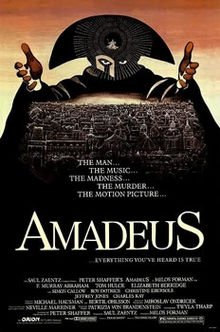Remember this movie?
After a long time I watched Miloš Forman's Amadeus again. It reminded me such an extraordinary filmmaker he was and shows a perfect example of masterfully movie directing.

Above all, the movie is a good example of what makes a motion picture popular and accomplished: Truth vs Reality. In my opinion good movies don't show the things the way they are, their main goal is to show them the way they should be; each subject has a hidden side waiting for an artist to find and show it to others, even that side is a fantasy he has made about it with his creativity. Let's be more specific with some examples.
Antonio Salieri
The character has been portrayed astoundingly By F. Murray Abraham, is someone who suffers from his mediocrity and wants to eliminate Mozart anyway he could. He orders Mozart a Mass piece anonymously knowing that writing this piece will lead the young artist to death and he intends to perform the music in Mozart funeral telling the world he was the creator of the music. The main idea of the movie inspired from a rumor widely was broadcast that Salieri poisoned Mozart because of jealousy. I can believe Antonio Salieri was being jealous of Mozart's abilities. I can even imagine him poisoning Mozart, but despite what the movie shows he was not a humble human being and a mediocre musician. Salieri is an important figure in opera and taught famous musicians such as Franz Peter Schubert, Ferencz Liszt and Ludwig van Beethoven. The fact is Salieri had been forgotten in modern area until Peter Shaffer wrote the play (the movie is an adaptation of the play). It's the creativity and intelligence of the writer to use an old rumor and a forgotten artist to create a perfect antagonist. I'm sure Salieri will be thankful of the writer to bring him back to memories while a biography of Mozart would be very boring without such a perfect and powerful antagonist.
Mozart
In movie Mozart is a rude person doesn't show manners. You find a different Mozart reading his letters to friends. It's obvious that a rebellion and kind of crazy artist with knid of 60's rock star behavior will be more pleasant for 80's audience. In a scene he is trying to persuade the Emperor to let him perform Le nozze di Figaro (The marraige of Figaro), he says "I hate politics" and he is honest. The truth is he was a member of Viennese Masonic lodge and remained a Mason until his death. Some historians believe even his unfinished famous mass piece, which in the movie has been ordered by Salieri, was meant for his Masonic lodge. The mass was finished by another composer, Franz Xaver Süssmayr, on demand of Mozart's widow, Constanze, but in the movie it is Salieri who writes the last pages beside Mozart's deathbed under his instructions. A brilliant act no one can not appreciate it, specially in the director's cut version with brilliant acting of two main actors.
Mozart's wife, Constanze, was a singer. She was the younger sister of a famous singer, whom Mozart loved first but he ended up marrying Constanze. Filmmakers completely forget these facts and make a funny scene in which Constanze's mother puts the Emperor in a position to order Mozart marry Constanze. The filmmakers prefer mentioning only one of the couple's children and ignore the other 6. That's a very clever choice because of the father issues they planted in the character.
The movie decides not to mention anything about Mozart's achievements in Prague, focusing on some failures in Vienna and prefers to show us a genius artist, who has not been understood in his time and died in poverty. This stereotype is something all audiences will adore. It looks like in the movie the only reason Mozart was not very popular in Vienna court and aristocrat circles was jealousy of Salieri and other musicians, which in reality was Mozart's own character. That's another trick to influence audience's emotion which has been played so smart and professional.
Patricide

image source
Once I read an article about the reason to Michael Jackson's numerous plastic surgeries. It suggested to find the reason in his complicated relationship with his father: He ruined his son childhood and youth by hard practices and forcing him to be a professional performer and instead, Michael Jackson decided to change his look and shape in a way to vanish any similarity to his father. True or False about late Mr Jackson, this is the main theme for Wolfgang's character in the movie. We know that Mozart's father was a good and famous musician who quit working after discovering his son's talent and dedicated himself to teach him and moving him all around Europe to perform showing his talent. It's obvious that Mozart was really obsessed to gain his father's approval. He has an unfinished piece written for his wife so she can sing for Mozart's father after his disapproval of their marriage, hoping her voice soften his father and change his mind. He also put an effort to make his father a free mason and persuaded him at last. The filmmakers used these facts to establish the character very masterfully. The reason is from the fist story tellers till now, from Oedipus to Hamlet, the theme patricide is a very popular and influential theme for human being and it seems this theme will never get old!
don't you think the "Truth vs Reality" will end up judgment as it comes to biography of a real figure?
afterall it is not an abstraction, but it is about things really happened not the way they should.
I liked the post, I would press the upvote more than once if I could!
I guess that's the necessity of cinema... cinema is that much irresponsible my friend.